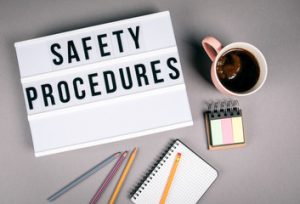Working in health and safety is morally rewarding. In addition, the average salary for all full-time practitioners is £40,000 according to IOSH 2017 salary survey which is well above the UK national average.
If you’re looking for a challenge away from the traditional career options, find out what it takes to be a health and safety practitioner.
Your Responsibilities as a Health and Safety Practitioner
Health and safety practitioners, use their knowledge and skills to promote a positive health and safety culture in the workplace. You’ll be responsible for ensuring that employers and workers comply with health and safety legislation, company internal health and safety policies, procedures and industry best practices.
Working in a range of organisations, from small and medium sized organisations to multinationals, health and safety practitioners plan, implement, monitor and review protective and preventative health and safety measures and drive continuous improvement.
If you are interested in finding out how to become a health and safety practitioners, there are a variety of factors to consider, such as the university degrees, necessary vocational qualifications, industry knowledge, and a career to building up your practical health and safety experience.
Salary
According to Prospects, with a health and safety adviser, for example:
- Starting salaries for health and safety advisers are usually in the region of £24,000 to £32,000.
- The role of senior health and safety adviser attracts a salary of around £40,000 to £55,000.
- Highly experienced advisers, such as the head of health and safety, earn £70,000 to £80,000.
Salaries vary significantly depending on the industry sectors, the size of the employing organisation and the level of your qualifications, knowledge, skills and experience. Income figures are intended as a guide only.
Employers
Health and safety practitioners are employed in a variety of industry settings, including:
- Chemicals industries
- Oil and gas industries
- Construction companies
- Engineering
- Transport and distribution
- Education and training institutions
- Entertainment and leisure
- Fire and rescue services
- Food, drink and tobacco manufacturing industries
- Hospitals and clinics
- Health and social care
- Hotel and restaurant chains
- catering and hospitality
- Retail industry
- Industrial, processing and manufacturing plants
- Large companies with responsibility for many office workers
- Local authorities and national government organisations
- Local government
- Public service
- Telecommunications
- Transport companies
- Universities and colleges
- And many more…
Qualifications and Experience
You can get into the health and safety career through:
- a university degree courses
- training qualifications through a professional body, e.g. Highfield, IOSH and NEBOSH
University
You can do a degree or postgraduate diploma recognised by the Institution of Occupational Safety and Health, here is the list of qualifications which meet the academic requirements for Associate/Technical (AIOSH/Tech IOSH) and Graduate (Grad IOSH) membership.
Qualifications
If you do not have a university degree in Occultation Safety and Health, you might need to gain a recognised qualification. There are many qualifications that are appropriate, but most health and safety practitioners start with short introductory courses, for example, IOSH Working Safely, the Highfield Level 3 Award in Health and Safety in the Workplace (RQF).
The NEBOSH National General Certificate in Occupational Health & Safety is one of the most widely held health and safety qualifications in the world. It is the first step in building your health and safety career!
If your job involves health and safety or when a greater level of knowledge is required a NEBOSH National General Certificate qualification (approximately two weeks classroom study) is well recognised. Nearly 9 in 10 employers (87%) ask for a NEBOSH qualification when recruiting to a health and safety position, according to NEBOSH Jobs Barometer, February 2019.
The Diploma is the required level of qualification for most health and safety manager roles. It needs approximately seven weeks full time study. This is a more demanding qualification and normally take 5 years to complete.
If you wish to work internationally, NEBOSH also offer international qualifications, the International General Certificate in Occupational Health and Safety can be a good start.
Career opportunities:
Building up Your Industry Knowledge and Experience
When you have completed the required qualifications, the most important thing is to find a job and build up your experience. If you are new to the industry, finding a workplace where you can learn new skills as you go along is extremely beneficial.
Professional Bodies
NEBOSH qualifications are recognised by professional membership bodies including the Institution of Occupational Safety and Health (IOSH), International Institute of Risk and Safety Management (IIRSM) and IEMA.
In 2019 IOSH updated its competency framework following extensive research and consultation with OSH professionals, employers and other stakeholders. OSH professionals now need a broader set of skills, knowledge and behaviours to manage and drive change. The framework can help you to focus minds on the competencies required in the profession. Health and safety professionals are recommended to use the framework as a reference tool to guide their development needs even though you are not yet an member of IOSH.
Becoming a member of a recognised professional body will help give you a head start on your career by demonstrating to potential employers a standard of competence, as well as keeping you up-to-date with any industry changes and best practice. You can learn more about how to become an IOSH member at IOSH website.
Other Professional Bodies:
You can join other HSE professional bodies depending on the industry sector you are currently working.
We Can Help
Horizon Risk Consultancy Ltd delivers a full range of health and safety qualifications from entry-level Highfields courses to higher level NEBOSH courses, helps you enter the health and safety profession and enhance your career. Please contact us for more information.


